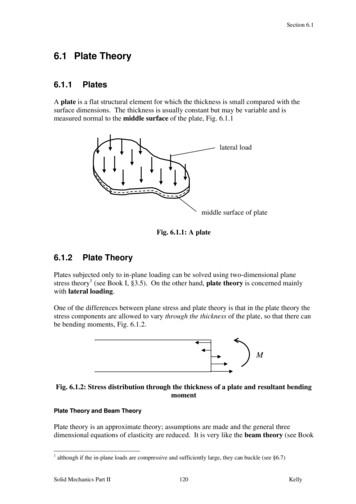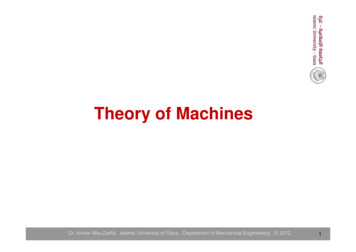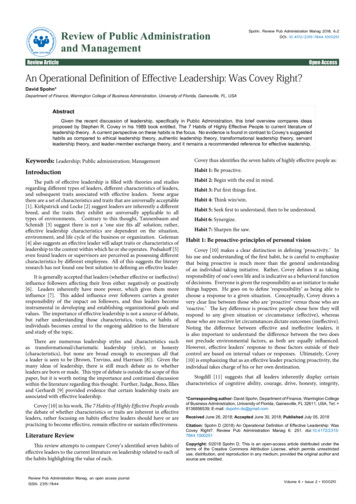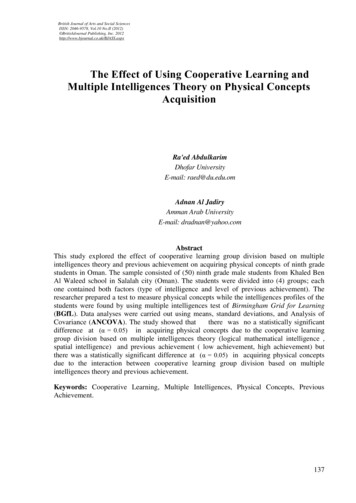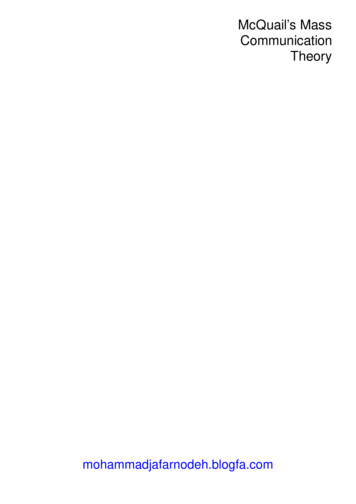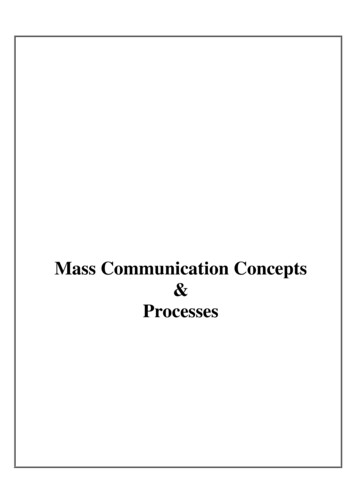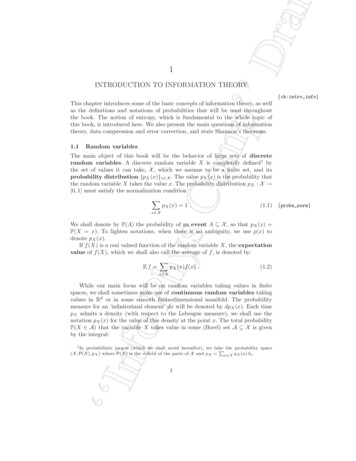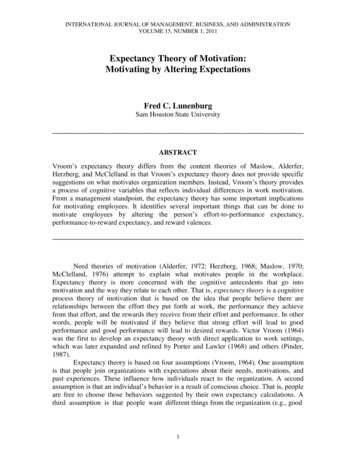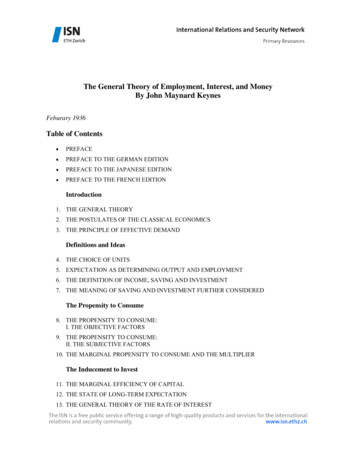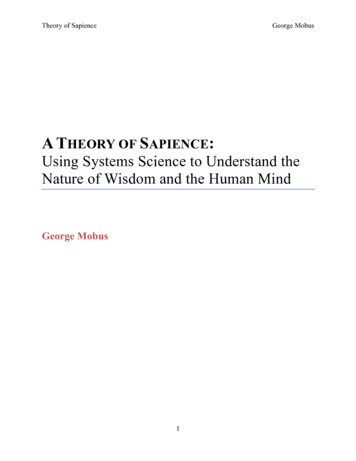
Transcription
Theory of SapienceGeorge MobusA THEORY OF SAPIENCE:Using Systems Science to Understand theNature of Wisdom and the Human MindGeorge Mobus1
Theory of SapienceGeorge MobusTABLE OF CONTENTSACKNOWLEDGEMENTS6PREFACE7Understanding the Human ConditionThe Missing Element – WisdomThe Cognitive (Brain) Basis for Wisdom789Toward Understanding SapienceThe Systems Science Approach to Understanding the Human ConditionToward a Better Understanding of the Human MindCHAPTER 1 - THE CONCEPT OF SAPIENCE11142124Homo sapiens: A New (?) Kind of AnimalEvolution of the New Kind of AnimalA New Kind of Consciousness242527The Principles of Systems Science and Application to Understanding the MindPrinciples of Systems ScienceThe Brain-Mind as a SystemApplication of the Principles and the Emergence of the Sapience ConceptHumans as Rational Agents2829334045Wisdom as a Psychological ConstructWisdom is Deep UnderstandingPsychological ConstructsIntroduction to ThinkingFrom Whence Cometh Wisdom4849505357Introducing the Components of SapienceJudgmentMoral SentimentSystems PerspectiveStrategic PerspectiveOther Psychological Attributes Associated with Sapience586064656871Conclusion75CHAPTER 2 – MAKING DECISIONS: RELATIONS OF INTELLIGENCE, CREATIVITY,AFFECT, AND SAPIENCEBeing in the World77772
Theory of SapienceGeorge MobusDecisions, DecisionsThe Four Constructs and Their ProcessorsTypes of DecisionsDecisions Modulated and Shaped by the Functional Processors77788185The Basic Relationships: A Functional Model93Circumscribing Intelligence, Creativity, Affect, and SapienceIntelligenceCreativityIntelligence Creativity ClevernessAffectSapience100100103106107109Making Decisions: Putting the Constructs Back TogetherWhere Do I Go From Here?Into the LabyrinthStructure of Decisions and How Cleverness, Affect, and Sapience ContributeBack to the Labyrinth112113113116123Conclusion124CHAPTER 3 - THE COGNITIVE COMPONENTS OF SAPIENCE EXPLAINED125Sapience as a System125Consciousness and the Mind ArchitectureDangerous TerritoryThe So-called “Hard Problem”Mental ArchitectureThe Evolution of Thinking – a PreviewSapience and the Level of Consciousness129129131133137148JudgmentEfficacious ModelsFrom Mechanical Judgments to Value Judgments to Strategic JudgmentsExpanded Dimensions of InteractionReflective Judgment — Meta-knowledge148148150153155Moral Sentiment and Guidance to ReasoningAltruism, Empathy, and Caring/SharingJustice and FairnessCooperativityEmotional Control156158160162163Systems PerspectiveThe Language of System1641643
Theory of SapienceGeorge MobusThree Perspectives Processed by the BrainAnalogical ReasoningSeed Knowledge — the Systems ScaffoldSapient Systems PerspectiveInteractions between Systems Perspective and Other Components173176177180184Strategic PerspectiveStrategic Thinking and WisdomWhat Are the Functions of Strategic Thinking?Planning186186188189Conclusion (So Far)190CHAPTER 4 - THE NEUROSCIENCE OF SAPIENCE192Brains and SapienceSome Necessary CautionWhat We Will Cover192192193Brain Complexity at Multiple ScalesBrain Complexity OverviewSystems Analysis and Bottom-up IntegrationComplexity in the Brain Reflects Complexity in the WorldThe SynapseThe NeuronThe Local NetworkNuclei and Cortical ModulesBrains and Hierarchical CyberneticsThe Neocortical Brain, the Prefrontal Cortex and Executive Control194194196198201204206207208212Neural Basis of Systems Representation and ModelsRepresenting Causal Relations in NeuronsRepresenting Concepts in Neural NetworksConstructing Concepts and Percepts in Specific Brain RegionsSymbols – A New Kind of Concept219219225233234The Seat of Sapience: The Prefrontal Cortex and Brodmann Area 10Language Production and UnderstandingThe Uniqueness of Brodmann Area 10Affect and Moral SentimentsEmotionsHigher-order DrivesSentiments and Morality237237239242243245246Primitive to Higher-order Judgment248Systems Intelligence2504
Theory of SapienceGeorge MobusHeuristic Programming in the BrainMental Simulation Models in Neural CircuitsConstructing Models — Guidance from the Prefrontal CortexObject-Oriented Programming: A Close Analogy to System Programming in the BrainOne More Trick the Brain Knows250252253254255Executive Functions and Strategic Judgment256Conclusion258CHAPTER 5 - THE EVOLUTION OF SAPIENCE: PAST AND FUTURE259Overview259The Emergence and Development of SapienceEvolution and Hierarchical Cybernetic Systems260262The Evolution of the Genus HomoEvolution of Strategic ThinkingEvolution of JudgmentEvolution of Eusociality and LanguageOf Grandmothers and WisdomThe Evolution of Spiritistic ThinkingWhy Sapience Strength is Probably Not Normally DistributedWhy the Evolution of Sapience May Have Come to a HaltRapid Evolution of the Prefrontal Cortex and Implications for the Future266268272273278279280283284The Future of SapienceWould Humans Be 'Better Off' With More Sapience?Will Nature Favor More Sapience?Can We Humans Intervene To Force the Selection of Greater Sapience?286286287289The Next Major Transition291BIBLIOGRAPHY295References and Further Reading295INDEX305ABOUT THE AUTHOR3145
Theory of SapienceGeorge MobusAcknowledgementsThe University of Washington Tacoma and the School of Engineering and Technology (SET)have graciously provided me with office space and computer support while completing thisbook. My thanks to the Dean of SET, Rajendra (Raj) Katti, for providing me with the supportand very useful discussions on this subject. Thanks as well to my co-author on our previousproject, “Principles of Systems Science”, Professor Emeritus, Michael Kalton, also for manygreat conversations delving into the nature of sapience and the human condition. Numerous otherscholars have provided useful commentary and feedback on a number of the ideas presented inthis work, unfortunately too many to list here.6
Theory of SapienceGeorge MobusPrefaceUnderstanding the Human ConditionConsider this perplexing question: If human beings are so smart, why have we not solved themany social and physical problems that have plagued humanity throughout history? Are poverty,war, and genocide (to name a few) really going to be with us always? Moreover, why are wefacing nearly imponderable problems that have developed due to our own inept actions, e.g.climate change?An on-going major presumption about our species has been that we are supremely intelligent,able to solve difficult problems and create technologies to satisfy our needs and wants. We are aclever species, far more so than any other. We can communicate using language. We can learnhow the world (meaning the universe) works through science. We can find and exploit numerousresources. We can occupy any environment on the planet and even off-planet, at least for shortperiods of time. From earliest times we have seen our species as fundamentally different fromevery other species. Indeed we have very often considered ourselves to be something differentfrom other life forms, superior, in control of our destinies. The very foundations of boththeological and secular humanism start with the presumption that human beings are exceptionalin creationist or evolutionary terms respectively. We all seem to think we are pretty exceptionaland of primary importance to the world.Yet, as the first decade of the 21st Century came to an end the evidence that we had made someserious mistakes in judgments and choices with global negative impacts became effectivelyundeniable. Many very serious scientists, philosophers, historians, and other disciplinariansrecognized the signs of dysfunction and questioned just how superior our intelligence might beunder the circumstances.Consider the effectiveness of various major governments in the world. How effective are they atidentifying the causes of these problems? How effective are they at establishing safe, secure, andprosperous conditions for all of their citizens? Consider the political processes that determinewho shall be put into decision-making positions in those governments. Are those processes reallyworking very well?We not only face problems that threaten us physically. We face problems with how we are evengoing to attack solving those problems.A growing number of cross-disciplinarians, those who find relations between different areas ofknowledge, began calling attention to an important aspect of all of these problems. It is clear thatall of them are interconnected. For example, burning fossil fuels, which are a finite resource,pumps excessive carbon dioxide into the atmosphere and oceans where it contributes to globalwarming and ocean acidification. But it also reduces the reserves of energy that is needed to7
Theory of SapienceGeorge Mobusdrive our economies. As the fuels are depleted they become more expensive1. The cost ofeverything goes up proportionately because everything we do, everything in the economy isbased on energy inputs to do real work. As a result the economies suffer. At the same time,increasing costs threaten our ability to mitigate the warming or adapt to problems like sea levelrising. Those activities will likely be very expensive. Can we afford them? The implications aredisturbing. Yet, so far, our governments seem incapable of any meaningful actions that wouldreduce the threats and prepare us for adaptation to the changes in climate we fully expect toaffect our lives2.Human minds, through creativity and intelligence, have developed the ability to extract and burnfossil fuels to increase the comfort of our lives; we possess a remarkable cognitive ability in theanimal world. But those very capabilities have produced a situation that is threatening our veryexistence if not addressed soon. The issues are not just complex, they are systemic. But evenwhile many similarly clever minds recognize the dangers wrought by our inventions and pellmell consumption of the comfort afforded, we, as a species, seem unable to exercise the wisdomneeded to preserve our future on the planet. “If human beings are so smart, why do we findourselves in this predicament?”The Missing Element – WisdomWhy do these problems exist in the first place? As stated, humans are incredibly intelligent andcreative. They came up with technologies that obtain and use this energy to make our lives morecomfortable and to create multiple forms of what we call ‘wealth.’ On the one hand we are betteroff physically for burning the fuels. On the other we are facing a dangerous future as a result ofthat burning. What is going on here?There is a paradox regarding the human condition. The evidence suggests that we are too cleverfor our own good3. Is it possible that, as Shakespeare’s Cassius claims “The fault, dear Brutus, isnot in our stars, But in ourselves, that we are underlings4”? Is it possible that there is somethingwithin us that prevents us from being able to use our cleverness to recognize unintendedconsequences of our clever inventions, or of our various, supposedly intelligent behaviors? Arewe “underlings” in the sense that we are incapable of making the right decisions in pursuinglife5? If so, can we identify the “fault in ourselves”? Can we consider possible remedies?1Hall & Klitgaard (2011).Klein (2014) has done an admirable job of documenting the fundamental mismatch between economicsbased on traditional (neoliberal) economics ideologies and the failures of governments to develop effective plans forreducing carbon emissions. Politicians (at least the conservative variety in the United States) find themselvesbetween a rock and a hard place. No matter what they might actually ‘believe’ about the science of global warmingand climate change, they cannot be seen to be in favor of anything that would be seen as counter-capitalism.3Dilworth (2009) has developed a compelling thesis regarding human nature that parallels some of theideas that I will be presenting in this book. His perspective is quite different – a philosophical form of argument –and I am not quite in accord on some details. Nevertheless it is a reasonably considered viewpoint.4Shakespeare, Julius Caesar , Act 1, Scene 2.5See Sternberg (2002) to get an idea of just how paradoxical our situation is.28
Theory of SapienceGeorge MobusIn fact, psychologists and neurobiologists have started to look more closely at the cognitivecapacity we generally recognize as wisdom. One motivation for doing so is that while there aredistinguishing characteristics to the construct, its presence, or its strength in many, if not mostindividuals seems to be wanting6. People, even more mature people, too often make unwisedecisions as evidenced by the consequences of those decisions. Now it seems society as a wholeis having issues with respect to making wise decisions regarding the very future of our species.There is a growing belief that wisdom, both on an individual basis and on a societal basis, islacking when it comes to how we manage our affairs, particularly as they impact the rest of ourworld. We act hastily. We act without due consideration of consequences, especially those thatarrive years from the present. We too often act with selfish materialistic motives rather thandoing what is best for society. Indeed, in our current neoliberal, neo-classical model ofeconomics, selfishness has become an institutionalized norm. There are even those who arguethat selfishness is a moral good! Are these behaviors and beliefs in accord with our long traditionof viewing wisdom as taking careful consideration and moral unselfishness into our judgments?Have we become culturally foolish in the name of material wealth? Or, is there something in us,a “fault”, a characteristic or failing, which causes us to act and think foolishly in spite of oursingular cleverness? Are we destined to make unwise choices, especially as the world becomesincreasingly complex?That we even know that there is something that we call wisdom is the result of some individualsdisplaying uncommon good judgment in difficult morally complex social problem solving. Thereare wise people in this world7. It just seems that they are rare. Is there an explanation for thisobservation?There may be. We need to explain the rarity. We need to explain why people as individuals andas collective social units all too often make unwise decisions. We need to explain why there aresome people who others recognize as wise, but also why most of us are not in that category.Perhaps most of all we have to explain why those to whom we do attribute wisdom are so rarelyattended.The Cognitive (Brain) Basis for WisdomThe study of wisdom as a psychological phenomenon is relatively recent. Psychology has longbeen interested in questions regarding the areas of intelligence, creativity, and affect as theyrelate to cognition. Over the last several decades these “constructs”8 have also been studied by6I will be presenting more evidence and analysis later for why this is the case. What we would generallyrecognize as wisdom (or rather, “wise-ness”) in people is thought to be a rarely occurring quality. More finely, I willconsider “degrees of wise-ness”, or levels of wisdom, akin to levels of intelligence, in the chapters ahead.7Goldberg (2005); Kitchener & Brenner (1990); Labouvie-Vief (1990)8I will be explaining the concept of a psychological construct more in chapter 1. But basically the idea of aconstruct is a constellation of measurable attributes that collectively define a major psychological phenomenon. Forexample, the intelligence construct involves several aspects such as memory (speed of learning, capacity, etc.) thatcan be measured using various forms of intelligence tests. Of course there are many different definitions of what9
Theory of SapienceGeorge Mobusneuroscientists or neuropsychologists using new technological methods for probing the brain asthey attempt to connect the phenomena to brain activities to localize what is going on in the brainas people solve puzzles (intelligence), think about unicorns (creativity), or react to emotion-richimages (affect). Additional work has probed the brain basis of early perception and how thatprocessing leads to abstract thinking (concepts and their manipulations in working memory).More recently some psychologists have tackled wisdom as a construct9. While the concept ofwisdom remains fuzzy at the boarders, there are some general agreements about various aspectsof wise-ness that are broadly held across cultures and between scientists who attempt tocategorize and measure its attributes.What is clear from the accumulating literature on the subject, wisdom is a major cognitivefacility that has a major impact on decision making. When it is lacking, bad decisions even fromseemingly rational analysis might ensue. When it is present, superior decisions can lead to goodlife outcomes. That is where wisdom is most notable – in making decisions regarding complexsocial problems. The wise elders (chapter 5) give guidance to the young tribe members based ontheir accumulated tacit knowledge (wisdom).This book is devoted to the exploration of the human mind from the perspective of systemsscience with special interest in these questions about how did we get into what appears to be verydifficult situations resulting from making unwise decisions. Can the use of systems scienceprinciples applied to understanding the human condition provide some answers, or at least pointin the direction of answers? The systems science approach may offer some insights that are notcurrently being considered in understanding human cognition and behaviors, insights that mighthelp us resolve the paradox.Human beings are autonomous decision agents10 in a complex web of social interactions wherethe decisions taken by any one person ripple effects through the web. No man or woman is anisland unto themselves11. What every individual decides determines their actions or at least theirspeech and consequently their impact on others. The magnitude of such impacts is in proportionto the cleverness exercised by the mind taking the decisions. For example the decision to burncarbon-based fuels in rotary engines to make machines go faster with greater power firstgoes into these various constellations! There appears to be some general agreement on the major issues, but it getsfuzzy at the boundaries. In this book I attempt to approach the problem with a bit more definitive circumscription ofthe several constructs in order to keep the analysis tractable.9See Sternberg (1990a), the introduction for a short history.10I will be using the term ‘agent’ in various contexts in the book. The basic notion is that an agent makesdecisions and takes actions that affect the future of not only themselves but others as well. Autonomy, as usedthroughout the book, will mean that the agent is not constrained to make decisions by a strict set of ‘rules’ as is thecase for a computer running an algorithm. Brains, as we will see, are non-deterministic processors and no two brainswill necessarily take the same exact decision given the exact same information due to path-dependent memoriesmaking each individual uniquely different.11Paraphrasing John Donne, Devotions upon Emergent Occasions, 1624.10
Theory of SapienceGeorge Mobusimpacted individual human lives by producing greater wealth, but then impacted us all in dealingwith the effects of carbon in the atmosphere.Cognition, including conscious thinking, subconscious thinking, learning concepts andgenerating behaviors, and generally interacting with the world, is the job of the brain.Intelligence, creativity, and affective modulation of thinking are all mediated by various brainregions and modules (chapter 4). So too, the capacity for being wise must be mediated byspecific brain areas/functions. The answers to questions about why wisdom is rare or in shortsupply in most people will come from a better understanding of the brain basis for the capacityfor wise-ness. That is what I propose to develop by using systems science to understandsapience.Toward Understanding SapienceThe extant human species is given the taxonomic name Homo sapiens12. The system of naming,called Binomial Nomenclature was developed by Carl Linnaeus (1707 – 1778) who also namedmany species including humans. The names chosen for species was meant to express thecharacteristic that differentiated them from cousin species in the same genus, or, failing to find adistinctive feature name, to specify either a locale (e.g. Homo neanderthal named for theNeander Valley in Germany where a sample skeleton was first discovered), or to honor a person(e.g. Aptenodytes forsteri, the emperor penguin is named after the German naturalist JohannReinhold Forster13). The word ‘sapiens’ is generally translated as ‘wise’, so Linnaeus named ourkind “man the wise.14” It is believed that he intended that interpretation given the dominant viewin Christian Europe of human beings as having been created in the image of God and the highestbeings on Earth (just short of angel status). He considered the great distinguishing feature ofhumanity as their capacity for wisdom. Throughout the rest of the animal kingdom no otheranimal shows a capacity for acquired wisdom; no animal seems to give wise advice to others.Humans seem to be able to do so.But what is wisdom? Why do humans seem to be capable of it and other animals, even ourclosest primate cousins are not? Until very recently in the science of psychology the firstquestion was not easily approached let alone answered. The concept of wisdom has always beenin the domains of philosophy and religion. Since so much has been written about the idea ofwisdom from these perspectives I do not propose to linger over their treatments. Accounts of12Throughout the book I adopt the traditional italicization of the formal binomial nomenclature designationof an animal name with the genus spelled with uppercase first letter – like a proper noun – and the species in alllowercase. The formal name of the animal is given in Latin, or Latinized terms.13See the Wikipedia article about the Emperor penguin: section on taxonomy where the naming by GeorgeRobert Gray, an English naturalist. http://en.wikipedia.org/wiki/Emperor penguin14Sapience derives from the Latin, sapere: to be wise.11
Theory of SapienceGeorge Mobushow these disciplines have treated the subject are abundant15. Instead I will turn attention to themost modern perspective of wisdom held by psychology.In this book I take the position that, indeed, as Linnaeus and the Greek philosophers, andreligious people have asserted, human beings are quite different from all other animals16 and thata brain function/capacity that we possess gives rise to a unique form of cognition that includesthe potential for developing wisdom. I call this sapience in respect to the name Linnaeus chosefor our species.Sapience, as I will lay it out in these pages, is not quite the same as wisdom per se, but it is thebasis for acquiring wisdom in a person’s lifetime. There is a collection of brain functions thatgive rise to this capacity. Several of these functions pre-existed to various degrees in earliermammals and primates especially. But at least one function seems to have emerged in laterhominins and expanded greatly (dramatically) in our species so as to constitute a difference inkind and not just in magnitude. Its influence on the other functions in the collection wasprofound; it appears to have boosted the power of the others considerably to produce the array ofcognitive features that clearly separate us from the animals. That new function was what I amcalling strategic thinking. This is the ability to cogitate over the past and the current situation, tothink about the future, and to formulate plans for actions to be taken in that future to improve thesituation in that future. In fact, in systems science, strategic “management” is a recognized aspectof what is called the hierarchical cybernetic system at the heart of sustainable adaptive systemslike living animals (Mobus & Kalton, 2014, chapter 9). Every living entity has within it anetwork of sensors and actuators along with a complex of decision processors that keep thewhole entity in balance and reactively interactive with its environment so as to keep that internalbalance, which is the basis of life itself. Strategic decisions are at the epitome of a hierarchicalcontrol system. Most living entities do not have a strategic decision processing capability builtinto their brains; this kind of processing takes a considerable investment in “hardware”. Thereason is that evolution is a process that “decides” what strategies any given species will use tolive. All that most animals, for example, need is just some amount of tactical decision making inorder to interact intelligently with their environment. One of the things I will argue that makehuman truly different from all other animals is that they have evolved to make strategicdecisions. Their brains include some special circuitry that “computes” strategic decisions andthis circuitry is the basis for sapience. It takes wisdom to have flexible, adaptable strategic plans.Thus strategic thinking acted as a kind of integrator with pre-existing functions and someresulting new functions that make Homo sapiens the unique species that it is.15For a cursory example refer to Sternberg (1990). He provides some background on the concept’streatment prior to the advent of psychological investigations.16The differences, especially the cognitive aspects, are explored quite well by Thomas Suddenforf (2013).The nature of human cognition, and how it differs from the rest of the animal kingdom, can be found in, Tomasello,M. (2014); Deacon, T. (1997); De Waal, F. (2005); Marcus, G. (2004); Donald, M. (1991, 2001); Gangestad, S.W.& Simpson, J.A. (eds. 2007); Mithen, S. (1996) to name just a few.12
Theory of SapienceGeorge MobusFor example, strategic thinking coupled with moral sentiment-driven judgment and a capacity tothink systemically created a mental space that produced the capacity for generative, recursive,symbolic language to dramatically boost communications between individuals, thus pushing ourgenus from mere eusociality to hyper-sociality. It produced the ability to weave stories, not onlyfrom the past but looking into the future. Every individual can construct models of entities andprocesses (systems) in the world as well as models of themselves (self-reflection). They canconstruct models of others (theory of mind). They can play “what-if” games with these modelsand propose hypotheses to be tested. In short, evolution produced a completely new kind ofbeing, building upon cognitive capabilities already in development, by adding a new kind ofcognition to the mix and coupling it with pre-existing abilities that completely changed what ananimal could do. And the new ability had an impact on other major cognitive capacities intelligence, creativity, and affect were impacted as well.Intelligence is a capacity to solve problems using various forms of reasoning, a generallymechanical process. It depends on memory systems, their speed of encoding and ease ofaccess/recall, and is particularly well developed in the mammals, some birds, and especiallyprimates. Intelligence always depended on judgment to modulate its processes and make it moreefficient. Creativity includes an ability to deal with novelty in the environment as well asgenerate novel behaviors. It is necessary to keep animals doing some form of exploring theirenvironments in a search for new resources. And affect is the oldest motivational and responsivemode of interacting with the world. Affective cognition goes back to the beginning of brainevolution (even further by some accounts). All three of these psychical modalities have been themain mechanisms resulting from brain evolution. They are responsible for low-level operationalcontrol of the body and behavior (motor control), logistical optimization of resource usage, andtactical management of interactions with the environment over time.In other words animal brains up through and including the hominins contained everythingnecessary to manage operationally, logistically, and tactically to fulfill the fundamental mandateof biology - stay alive and reproduce as much as possible. Staying alive required fitness of thephenotype. Reproducing was the payoff. The fittest produced the greater number of offspring,which then, due to inheriting fitness repeated the cycle. Evolution took care of the strategicmanagement issues. Animals evolved to continue to be fit in ever changing environments, whichincluded some genera giving rise to more complex brains for handling greater amounts ofinformation. Their survival and thriving strategies were molded by the species’ experiences inlife.But the human brain acquired a capacity for strategic thinking, that is, an ability to generatepossible futures for individuals and not just reaction of a species to what the environment did.They acquired the ability to willfully change the environment to conform to their desires. Andthat, it seems to me, is the real meaning behind the myth of Prometheus giving fire to humans.That story was an attempt to explain (in a pre-scientific age) how it is that humans are sosignificantly different from the rest of the animal kingdom. We represent a breakthrough in13
Theory of SapienceGeorge Mobusevolutionary terms, in mental “technology.” We are to evolutionary history what the computerrevolution was to societal history. Things are different now.I will make an attempt to explicate what, how, and even why this revolution in cognitionemerged. However I should point out that though we may represent a breakthrough it does notmean that we are “better off.” As I will shortly explain, in fact, we are, as a species, worse off insome important ways17. We may be the first species on Earth to acquire responsibility for ourown strategic management, both as individuals and for the groups, but what we acquired seems
The Principles of Systems Science and Application to Understanding the Mind 28 Principles of Systems Science 29 The Brain-Mind as a System 33 Application of the Principles and the Emergence of the Sapience Concept 40 . book. My thanks to the Dean of SET

